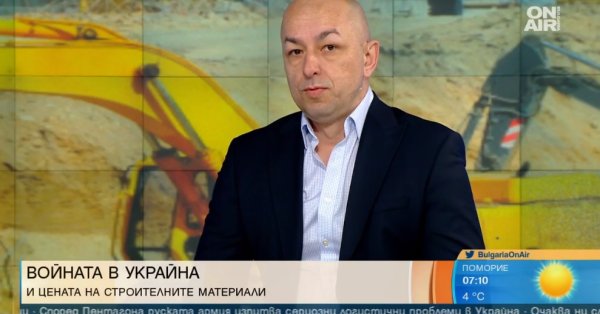40% of the steel that Bulgaria imports comes from Ukraine. Much of it is from the Donbass region.
"For Bulgaria the problem is local. On the international markets for one year the prices fall - from 1900 euros per ton in the summer, now it is 1137 euros. In Bulgaria the prices have always been about 30% lower. Now they are rising and are now about 90% of the Europeans ", said the economic adviser from the Bulgarian Industrial Association Shteryo Nozharov.
As one of the options for compensating for the reduced imports, he pointed out the activation of the capacities that work with scrap.
"We need effective waste management, we have unrealized potential. Turkey is a big producer and close to us. We are fulfilling our quotas from there. The cheapest used to be steel from Iran and China. But transport costs have jumped due to fuels and more expensive supplies", the economic expert commented.
“In construction there is a jump in the prices of concrete, cables”, Nozharov outlined as a factor in pricing and raising the minimum wage.
"Force majeure comes from energy-intensive industries - fertilizers, glass, cement. The production itself is energy-intensive for them and prices jump at times. Suppliers of such materials, seeing the increase in prices, hold back sales to balance prices at a higher level. This slows down deliveries and threatens bankruptcy of part of the construction industry," Nozharov warned.
He outlined investing in land as a good option for the sector.
"Real estate is becoming more expensive, but in conditions of conflict the land is getting cheaper. Most investors will focus on buying land, it is a profitable investment," suggested the economic adviser from BIA.
The expert also commented on the increase in the minimum wage. According to him, this will lead to the reduction of 150 000 people.
"In any case, the amount was accepted, although without an impact assessment. One of the objections we raised at the meeting of trade unions and employers with the government was that it does not include length of service and qualifications. If they do, for half of the employees it will be BGN 782. Thus, we will be one of the five countries in Europe that will have the highest minimum wage rate than the average," Nozharov said.
According to him, rules are needed to determine the minimum wage.
"The increase for administrative reasons does not correspond to labor productivity. Employers wanted us to have a clear mechanism for determining the minimum wage. Trade unions – for it to cover the cost of living, but also labor productivity, to guarantee employment. Its increase in times of crisis leads to layoffs," Nozharov added.






